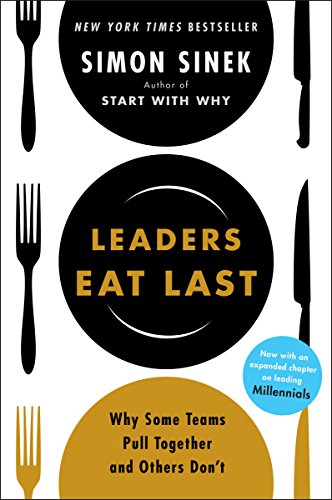
Leaders Eat Last by Simon Sinek
A company’s biggest strength doesn’t lie in its products or services. It always lies in its people, and in their ability to cooperate closely and rally behind the organization, especially during a crisis.
However, loyalty and commitment must be earned. Today, work has become a contractual, transactional relationship in many organizations. Intense competition and layoffs are the norm. Hardly anyone believes in loyalty to a company anymore, much less lifetime employment.
The 4 Chemicals (E.D.S.O.)
Each of us is an individual and a part of social groups. We make daily decisions that require us to weigh our self-interests against group interests. This dilemma also happens in our bodies via 4 key chemicals:
-
Endorphins and dopamine drive us to satisfy our personal needs, e.g. to find food, develop solutions and persevere through problems. They help us to get things done, so we can survive.
-
Serotonin and oxytocin encourage us to work together with others. They build feelings of trust, loyalty and camaraderie, strengthen our social bonds and increase our inclination to cooperate with others to achieve what we can’t on our own.
Circles of Safety
Traditionally, our family provides a Circle of Safety where we feel safe and supported. Inside the circle, we have a healthy balance of E.D.S.O. and low Cortisol levels. In organizations, Circles of Safety provide people with a sense of belonging and security. This facilitates communication, cooperation, problem-solving and innovation, allowing people to direct their attention to external threats and opportunities. In contrast, when people feel threatened by internal politics and infighting, they turn their attention inward to focus on self-preservation, making the group more vulnerable as a whole.
Leaders must earn others’ respect and loyalty by making the most sacrifices and being willing to eat last. They must give trust to earn trust.
A Society that’s Out of Balance
Each of the 4 E.D.S.O. chemicals play important roles in our survival. When they’re in balance, people prosper the way they’re designed to, and their groups/organizations prosper too. Unfortunately, the modern workplace tends to be overflowed with Cortisol and dopamine addiction. We lack Circles of Safety and have become dangerously imbalanced. How did we get here?
- Abstraction and Dehumanization: how management via numbers, global systems and virtual interactions can be dangerous and lead to careless acts.
- Destructive Abundance: how humans respond to shortage vs excess, and why/how leaders have become so blinded by the commercial interest that they’ve forgotten who they’re supposed to serve.
- Social Changes: how our societal norms and values have changed with the post-WWII Boomer Generation, followed by Gen-Xers and Gen-Ys, to become increasingly dopamine-addicted and imbalanced.
Simon Sinek offers many detailed examples and stories of leaders in all walks from the military to politics and businesses.